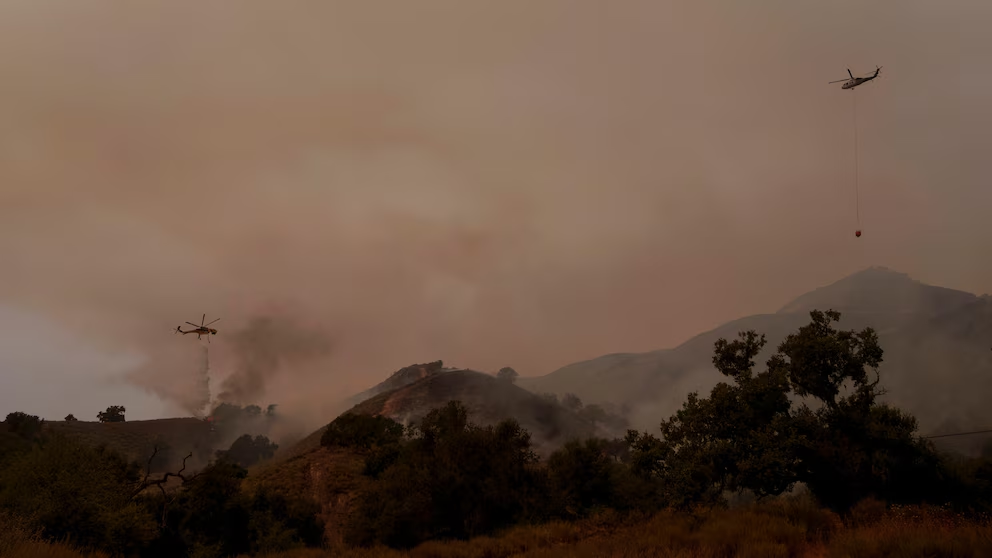LOS ANGELES — A long-running heat wave that has already shattered previous records across the U.S. persisted on Sunday, baking parts of the West with dangerous temperatures that caused the death of a motorcyclist in Death Valley and held the East in its hot and humid grip.
An excessive heat warning — the National Weather Service’s highest alert — was in effect for about 36 million people, or about 10% of the population, said NWS meteorologist Bryan Jackson. Dozens of locations in the West and Pacific Northwest tied or broke previous heat records.
Many areas in Northern California surpassed 110 degrees (43.3 C), with the city of Redding topping out at a record 119 (48.3 C). Phoenix set a new daily record Sunday for the warmest low temperature: it never got below 92 F (33.3 C).
A high temperature of 128 F (53.3 C) was recorded Saturday and Sunday at Death Valley National Park in eastern California, where a visitor died Saturday from heat exposure and another person was hospitalized, officials said.
The two visitors were part of a group of six motorcyclists riding through the Badwater Basin area amid scorching weather, the park said in a statement.
The person who died was not identified. The other motorcyclist was transported to a Las Vegas hospital for “severe heat illness,” the statement said. Due to the high temperatures, emergency medical helicopters were unable to respond, as the aircraft cannot generally fly safely over 120 F (48.8 C), officials said.
The other four members of the party were treated at the scene.
“While this is a very exciting time to experience potential world record setting temperatures in Death Valley, we encourage visitors to choose their activities carefully, avoiding prolonged periods of time outside of an air-conditioned vehicle or building when temperatures are this high,” said park Superintendent Mike Reynolds.
Officials warned that heat illness and injury are cumulative and can build over the course of a day or days.
“Besides not being able to cool down while riding due to high ambient air temperatures, experiencing Death Valley by motorcycle when it is this hot is further challenged by the necessary heavy safety gear worn to reduce injuries during an accident,” the park statement said.
The soaring temperatures didn’t faze Chris Kinsel, a Death Valley visitor who said it was “like Christmas day for me” to be there on a record-breaking day. Kinsel said he and his wife typically come to the park during the winter, when it’s still plenty warm — but that’s nothing compared with being at one of the hottest places on Earth in July.
“Death Valley during the summer has always been a bucket list thing for me. For most of my life, I’ve wanted to come out here in summertime,” said Kinsel, who was visiting Death Valley’s Badwater Basin area from Las Vegas.
Kinsel said he planned to go to the park’s visitor center to have his photo taken next to the digital sign displaying the current temperature.
Across the desert in Nevada, Natasha Ivory took four of her eight children to a water park in Mount Charleston, outside Las Vegas, which on Sunday set a record high of 120 F (48.8 C).
“They’re having a ball,” Ivory told Fox5 Vegas said. “I’m going to get wet too. It’s too hot not to.”
Jill Workman Anderson also was at Mount Charleston, taking her dog for a short hike and enjoying the view.
“We can look out and see the desert,” she said. “It was also 30 degrees cooler than northwest Las Vegas, where we live.”
Triple-digit temperatures were common across Oregon, where several records were toppled — including in Salem, where on Sunday it hit 103 F (39.4 C), topping the 99 F (37.2 C) mark set in 1960. On the more-humid East Coast, temperatures above 100 degrees were widespread, though no excessive heat advisories were in effect for Sunday.
“Drink plenty of fluids, stay in an air-conditioned room, stay out of the sun, and check up on relatives and neighbors,” read a weather service advisory for the Baltimore area. “Young children and pets should never be left unattended in vehicles under any circumstances.”
Rare heat advisories were extended even into higher elevations including around Lake Tahoe, on the border of California and Nevada, with the weather service in Reno, Nevada, warning of “major heat risk impacts, even in the mountains.”
“How hot are we talking? Well, high temperatures across (western Nevada and northeastern California) won’t get below 100 degrees (37.8 C) until next weekend,” the service posted online. “And unfortunately, there won’t be much relief overnight either.”
More extreme highs are in the near forecast, including possibly 130 F (54.4 C) around midweek at Furnace Creek, California, in Death Valley. The hottest temperature ever officially recorded on Earth was 134 F (56.67 C) in July 1913 in Death Valley, though some experts dispute that measurement and say the real record was 130 F (54.4 C), recorded there in July 2021.
Tracy Housley, a native of Manchester, England, said she decided to drive from her hotel in Las Vegas to Death Valley after hearing on the radio that temperatures could approach record levels.
“We just thought, let’s be there for that,” Housley said Sunday. “Let’s go for the experience.”
In Arizona’s Maricopa County, which encompasses Phoenix, there have been at least 13 confirmed heat-related deaths this year, along with more than 160 other deaths suspected of being related to heat that are still under investigation, according to a recent report.
That does not include the death of a 10-year-old boy last week in Phoenix who suffered a “heat-related medical event” while hiking with family at South Mountain Park and Preserve, according to police.
In California, crews worked in sweltering conditions to battle a series of wildfires across the state.
In Santa Barbara County, northwest of Los Angeles, the growing Lake Fire had scorched more than 25 square miles (66.5 square kilometers) of dry grass, brush and timber after breaking out Friday. There was no containment by Sunday. The blaze was burning through mostly uninhabited wildland, but some rural homes were under evacuation orders.




